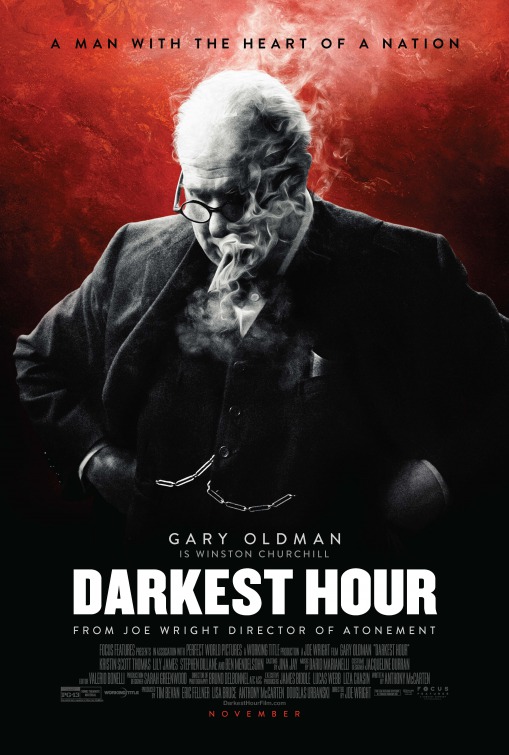It Takes The Power Of Leadership To Unite A Nation
Director
Joe Wright
Starring
Gary Oldman
Lily James
Kristin Scott Thomas
Stephen Dillane
Ben Mendelsohn
Ronald Pickup
Set during the early days of World War II, the British Prime Minister, Neville Chamberlin [Pickup] is being crucified in parliament for his seemingly weak challenging of the Nazi forces sweeping through Europe. Through a vote of no confidence, he is pressured to step down and while personal friend of the King, Lord Halifax [Dillane] seems the right choice, he refuses, leaving the only candidate that both major parties will deal with being Winston Churchill [Oldman]. Churchill is a gruff, rambling oddity with the enormous task of leading the country through an escalating and, from their perspective, failing conflict. With his appointment as Prime Minister confirmed, he sets out leading the country but his unorthodox methods and bullish manner rile his superiors, his colleagues and leaders of other foreign nations. Seemingly, the main question posed by this feature is, will he be able to lead Britain to victory?
I must confess, despite Gary Oldman being one of my all-time favourite actors, I had immediate concerns regarding this release. Owing to the political climate in Britain over the last decade or two (indeed much of the Western world) there has been a worrying rise in adoption and warping of figures and events to instil some nostalgia for a past that never was. And of all the figures of this island’s past, Winston Churchill is one of the trickier, more divisive ones. Up until World War II the man was not exceptionally liked and seen as something of an over-the-hill failure, it’s only because he saw Britain through one of its most desperate times that he is galvanised in the public eye and as such the British public have a split view on the man himself. Subsequently, any major biopic was in clear danger of being jingoistic, flag-waving, patriotic nonsense but to my surprise, much like Dunkirk, there is only a hint of these detrimental elements with a helpful doses of charm and sobering relatability.
As with all biopics, the central performance is paramount and while Oldman may seem like an unorthodox choice, he is absolutely amazing in the role, wonderfully humanising Churchill, elevating him from the caricatures, mythology and propaganda. Part of this complete immersion is achieved by the genuinely breath-taking make-up. All too often ageing prosthetics or altering an actor’s facial contours to mirror that of a historical figure get lost in an uncanny valley, which, while achieving the initial desired effect, takes you out of the story. Oldman’s performance is so blisteringly committed that you often forget about the acting – as it were – and see only the performance. The fact that these methods work equally from extreme distance and under extreme close-up is a genuine testament to the craft. But this is merely one half of the role and it would be all too easy to credit all positives to the external accoutrement. What Oldman brings to this character is far more important, from his diction, the cadence and delivery, his posture and the way he moves, everything is about creating something other than another side of Gary Oldman. The supporting characters largely get short thrift in terms of importance and prominence, settling on either side of a line between those who support or hinder the lead; but this is typical of these features, so there isn’t really much to comment on there. Stephen Dillane delivers with reserved sincerity, as does Ronald Pickup. The two relative standouts for me were Kristin Scott Thomas as Clementine Churchill, the ever constant support and compass and Ben Mendelsohn as King George VI, whose initial contempt for the Prime Minister is palpable but softens over time.
Another delightful surprise was the amount of creativity present. High-profile period pieces almost always excel when it comes to production design elements, such as costumes, locations, set, hair, make-up, etc but on top of that, the nuance of the composition, camera movement and direction was a welcome treat. At the same time, the sound design was all very pleasing, specifically the score, which has a buoyancy to it, despite the subject matter; keeping things relatively light.
This release, however, is not without its flaws and one of the biggest problems is the narrative flow itself. Much like The King’s Speech, Darkest Hour ends without seeing the story to fruition, we celebrate the rise of the man but not the full extent of trials and tribulations he encountered. One could argue that is the unfortunate and restricting nature of cinema (as opposed to serialised television) but while the film doesn’t feel like it drags or lingers on any one superfluous element, what is presented feels like it could be leaner or used the runtime to cover a wider period of time. Furthermore, the film itself never really says much of anything, robbing the film of any tension. It’s very unlikely audiences will side with a Nazi invasion and while Churchill’s foaming fury might come off as overzealous or war-hungry, we know through hindsight that he was right to fight the Nazis rather than appeal to them. But again, this is an unfortunate pitfall of these types of feature.
For someone who expected this to be a dire release, I was honestly shocked to learn that it is a capable, entertaining and extremely well-acted feature and one more than deserving of attention and praise.
Release Date:
12th January 2018
The Scene To Look Out For:
When trying to highlight a single scene which encapsulates the wealth of talent involved in making this feature, it’s very easy to point to the scene wherein Churchill is desperate and alone in a very small room, connected by telephone to the American President. His voice shakes, he creaks back and forth in a small wooden chair and all the while the voice on the other end of the crackly phone line regretfully explains he is not in a legal position to assist. The earnest despondency is rather cutting and extremely well shot, edited and scored.
Notable Characters:
One character I haven’t mentioned much at all is that of Churchill’s newly appointed secretary, Elizabeth Layton, played by Lily James. She is obviously the audience surrogate, in the same way that Traudl Junge was in Der Untergang. But unlike Traudl, Layton’s involvement and impact on the story is pretty weak and underdeveloped. Rather than chastise James directly, who performs admirably with what she’s given, the script simply doesn’t give her much in the way of personality or presence.
Highlighted Quote:
“The public need to be led, not misled, not to figure it out for themselves”
In A Few Words:
“A well-handled biopic which largely succeeds because of the components that bring it to life and the cordoned-off section of the subject’s life that is explored”
Total Score: 3/5
![The Red Right Hand Movie Reviews [Matthew Stogdon]](https://reviews.theredrighthand.co.uk/wp-content/uploads/2021/12/cropped-header1.png)




